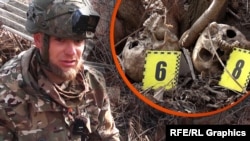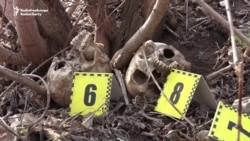The bodies lie where they fell -- some torn apart by animals, others scattered by explosions. In a field near the small town of Krasnopillya in eastern Ukraine, the remains of two Russian soldiers are barely recognizable.
Oleksiy Yukov, head of the volunteer organization Platsdarm, points to the ground.
"There's one person here, another over there. The body parts are completely scattered."
Yukov and his team specialize in retrieving corpses from active and recently contested battlefields. It's a grim mission: Recover human remains, identify them if possible, and prepare them for repatriation or exchange.
The pair of bodies they've found date back to 2022, from an assault on the Dolyna-Krasnopillya line. Russian forces pushed into the area, entrenched, and were later forced out.
"The fighting here was intense," Yukov says. "This is where the 95th Brigade stopped them before they could reach Slovyansk."
The work is conducted under constant threat. Land mines and unexploded ordnance litter the ground. Drones fly overhead, sometimes firing on recovery teams.
"It's almost impossible to work now," says Artur, another volunteer. "Before, we could move under cloud cover or rain. Now it's too risky. We've been hit before."
Yukov explains that they always need to work fast without thinking whose bodies they are picking up.
"You take whoever you see first," Yukov says. "There's no time to figure out if they're ours or theirs. You grab the body and run."
Sometimes, the only hope of identification is a cross, a ring, a tattoo -- anything relatives might recognize. If identified, the bodies are sent back to the Russian side in the hope of exchanging them for Ukrainian soldiers killed in occupied territories.
"For us, it's very important that every guy and girl comes home."















